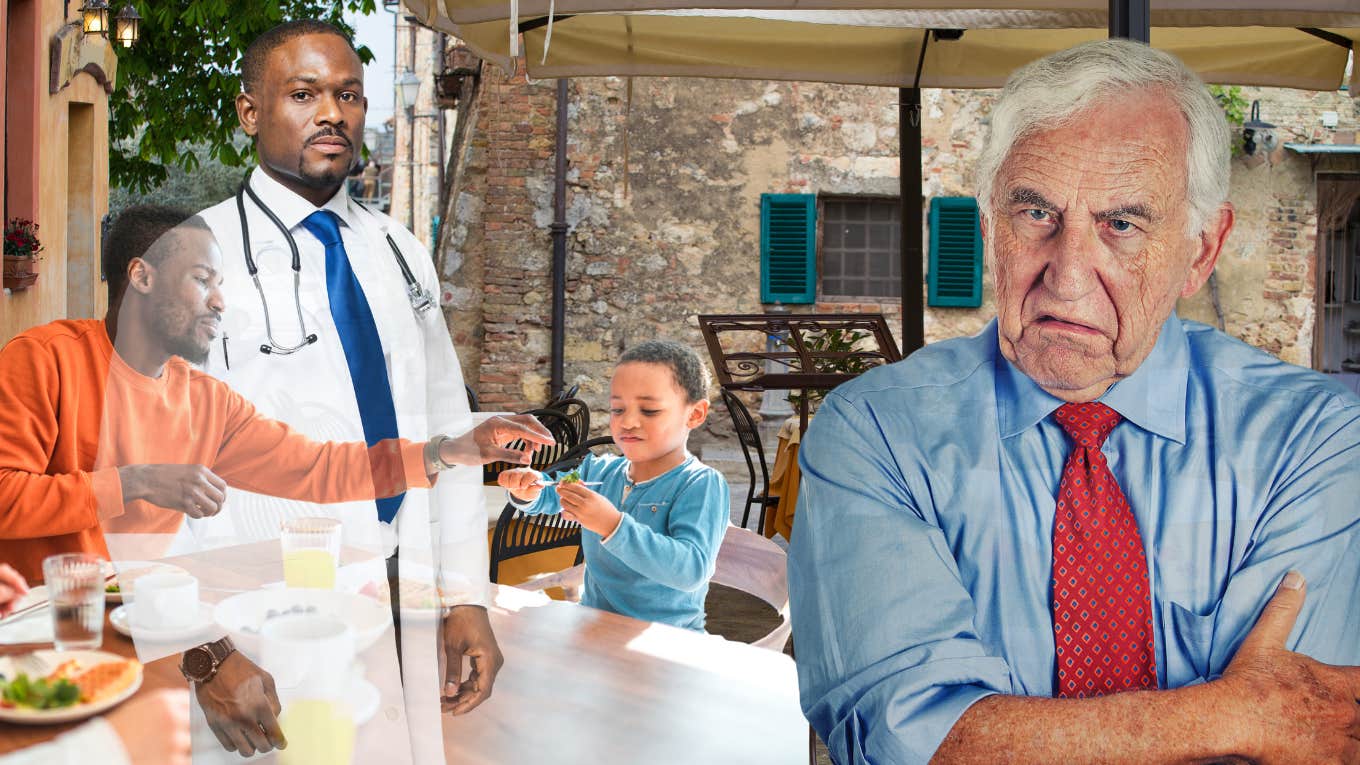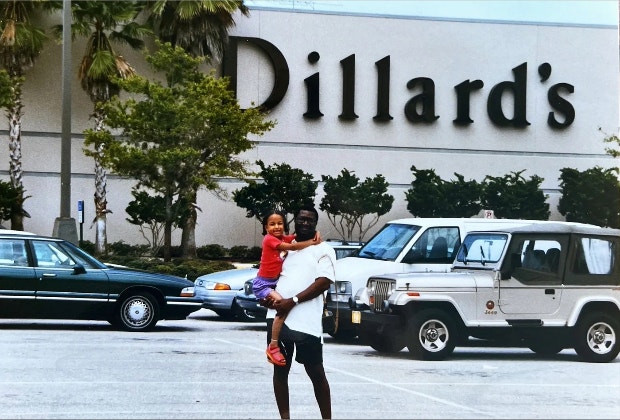I Watched My Black Father Save A Racist Man’s Life
When bigotry meets survival, which one is likely to prevail?
 AzmanL, sergiimostovyi, SIphotography, Minerva Studio | Canva
AzmanL, sergiimostovyi, SIphotography, Minerva Studio | Canva The events of this story took place about 25 years ago in a small breakfast diner just south of Orlando, Florida.
I was only seven years old at the time, yet the memories from this experience are as vivid as the ones I can recall from yesterday. We were on our first family holiday at Disneyworld.
Our daily ritual was to get in a substantial breakfast before exploring the parks — my mother never let us have junk food back home, so every day felt like Christmas morning. A welcome opportunity for my older brother and me to avariciously stuff ourselves with pancakes, bacon, and maple syrup.
As we were standing in line waiting to be seated, directly in front of us stood an elderly couple — a well-dressed man and woman in their seventies, short in stature and smelling like expensive cologne. The man had the whitest hair I’d ever seen — it sat on top of his head like a slick dollop of freshly whipped cream.
As he heard my father say something with his hearty Nigerian accent, he turned, eyed us markedly up and down, and turned back around silently.
The server — a gangly Black boy with a soft voice — came to greet them. He introduced himself and told them to wait just one moment while he headed to the back.
"Another one," the man said, leaning sideways into his wife. "Sooner or later, it’ll be nothing left but [the N-word]."
He angled his face slightly over his shoulder as he said it, making a point to project it — not enough to cause a scene but just enough to guarantee audibility to its intended audience: any Black person within earshot.
I remember feeling my mother brace momentarily as she held my hand. She exhaled and said nothing. Her blonde hair and blue eyes glowed under the strip light above us. My father stood quietly with his arm around my brother.
An uncomfortable silence hung in the air, thick and tar-like.
I had no idea what was going on; all I knew was that I wanted strawberry lemonade with as much ice as could fit in the glass. But, seeing my mother’s reaction prompted me to later ask about the N-word since I’d never heard it before.
That made for a memorable car ride.
The couple were quickly ushered to their seats, and soon enough, we were also making our way to our booth on the other side of the diner. The server handed us our menus, smiled warmly at my father, and excused himself.
We sat down to order and, within minutes, saw the table replete with the most indulgent breakfast foods a seven-year-old non-American could imagine.
As we dined and discussed the plan for the day — a relaxing afternoon at Busch Gardens followed by a nice steak restaurant for dinner — the abrupt sound of breaking glass and a piercing screech severed the serenity of the atmosphere.
"HELP! PLEASE! Somebody help us!"
Everyone in the diner turned to look.
"Call 911! Ron, honey! Oh God, someone help us!"
My father rose quickly from his seat, dropping his napkin. He looked over towards the commotion, quickly slid out of the booth, and took off running.
My brother and I leaped up onto our seats to survey the scene.
It was the elderly couple from before.
The lady was shrieking and crying, high-pitched, helpless whoops leaving her thin pink lips. Opposite her was her husband, doubled over, his wrinkled hands splayed on the table. He seemed to be hacking, salivating profusely, his eyes wide and unblinking. He gestured frantically to his throat.
Within seconds my father pulled the man out from his seat, pushed the chair and table back, and, facing him away, clasped his hands together into a fist and started administering the Heimlich maneuver.
One.
Two.
Three.
Strong, heavy-handed pounds were delivered to the man’s sternum. His feeble body next to my father’s six-foot-four, ice-white pallor against skin as dark as night.
His wife continued to wail with abandon, powerless to intervene in the events unfolding in front of her.
My brother and I watched completely aghast as my father whipped the man around and hooked a dark, fleshy finger inside his mouth to remove whatever had been lodged in his airway.
A bolus of food made its way to the floor.
The man gasped and sputtered, inhaling as though he had just breached the water’s surface.
My father reached for a nearby chair and gently ushered the man to sit on it, rubbing his back and saying something to him that I couldn’t quite make out over the hubbub. He nodded in understanding as he continued to cling to his breath.
Then he approached the man’s wife, who pulled him into a weepy embrace. He wrapped his arm around her shoulders, offering her a tissue out of his trouser pocket. I could see the dark streaks of her mascara skidding down her cheeks as she mopped at her eyes.
I’m not sure why, but witnessing what happened scared me. I remember feeling overwhelmed by what my father was capable of.
I’d heard about the things he had accomplished in the odd newspaper article, but that was the first time I had actually witnessed him in action as a doctor.
Long nights at the hospital often took him away from me as a child to a mysterious world I never set foot in — one of Code Reds, sprinting down hallways, resuscitation, and the consolation of heartbroken humans in the waiting room.
My father was born and raised in Ibadan, Nigeria. He left his homeland at the age of 21 to pursue a medical degree in the UK and, although now retired, boasts a colorful career spanning 50 years as a Senior Consultant of Emergency Medicine and Trauma Surgery.
A humble man, he never seeks reverence or adulation for his commitment to saving lives. He tends to downplay his involvement in happy outcomes, discreetly exiting the scene when he’s confident that all is okay.
The image of him that day is forever etched into my memory like scrapings on a rock face. The gravitas has, interestingly, metamorphosed over time.
When I was seven, it impressed me because he saved a man from an untimely death by choking. It was cool. We got our bill paid in full, free ice cream, and a gift card as a reward. People came to shake his hand and wish us all well.
But now, with the passage of time and my own lived experiences as a biracial woman, it’s even more affecting since I’m acutely aware of the nuances shrouding that event.
A Black man, peacefully minding his own business with his family, didn’t just save an elderly man from choking to death over his breakfast. He saved a racist elderly man. A man who had been explicitly rude towards him just moments prior.
The context of that situation stands out to me like a flame pervading the darkness.
There’s something slightly perverse about that, isn’t there?
When I was about 21, I remember asking my father why he was so willing to help, despite the blatant racism.
"Well, Nattie," he posited calmly, "he may be racist. But I’m not."
I realized then that I still had some way to go to reach a comparable level of spiritual ascension.
My father’s class and compassion are certainly admirable, but on the other hand, I find that sort of situation really frustrating because of the moral turmoil it puts you in.
Fortunately, I’ve never been tasked with a true life-or-death decision, despite the umpteen times I’ve hypothesized over what I would do should I find myself in one.
We can get flippant in our hypotheses, can’t we — would you save a bigot/homophobe/abuser’s life? What would you do if such and such happened?
I’d very cavalierly consider not doing so in response to his flagrant disregard for people’s right to be Black in public. Even though I know myself — I’m a wise-talking empath, and the guilt would cripple me for the rest of my days.
As someone with an interest in philosophy, I frequently consider the meaning of life and what our world would look like if existence were based on meritocracy.
To me, that man was an ignorant old fool with a big mouth and a small conscience. To his wife, he might have been the greatest man she’d ever known.
So … a good man or a bad man? Can it ever be that simple?
The oath my father took as a junior doctor removed his permission to even contemplate that decision. It’s attempt to save a life or bust.
Personal ethics have no bearing over which lives you save as a medical professional. Doctors have to rise above the ordinary immaturity afforded to mere mortals like us.
But where do you sit on the racism spectrum?
One thing I do recall about that day was how willing that couple was to accept my father’s help. Granted, tensions were at an all-time high, and logic and bigotry took a backseat to make way for survival; however, it does beg the question: When your survival hangs in the balance, how steadfast is your bigotry? How far into the pits of intolerance are you willing to go before you pull the plug and backpedal?
To be honest, I don’t blame them for letting my father save Ron’s life. I think most would do the same, regardless of how they feel about the creed of the doctor, nurse, firefighter, or other life-saver in question.
To die on the hill of your prejudice takes guts that I don’t believe the vast majority possesses.
Again, we can hypothesize ad nauseam, but when the chips are well and truly down, I imagine that most would accept whatever color life raft is offered to them.
Observing my father navigate the world as a Black man has taught me greater lessons than any curriculum ever could. They often come at a price, a price that my light skin shields me from, but they never fail to stick.
I’m just grateful to have such an admirable teacher — one I hope to continue learning from for many more years to come.

Photo by author
Natalie S. Ohio is a writer and business owner. Her work has been featured in international publications such as Wholistique, ZORA, The Virago, Prism & Pen, AfroSapiophile, and Zankyou, among others.

